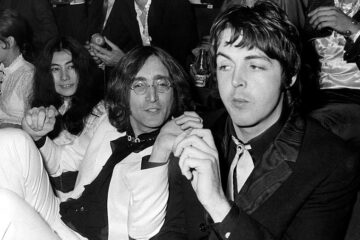The Beatles’ 1968 self-titled album is full of bizarre and unsettling characters, from Bungalow Bill to Rocky Raccoon. Perhaps the most unsettling of all, though, is John Lennon’s miserly creation, Mr Mustard. While scrabbling around for songs he could contribute to an album he was only half-interested in, Lennon eventually offered up the unfinished ‘Mean Mr Mustard’ for the medley on Abbey Road.
In the band’s Anthology documentary, he’s quoted as saying that the song and its sister, ‘Polythene Pam’, were nothing more than “bits of crap that I wrote in India”. As part of an extended suite of songs on which they both feature, though, they’re more than fine, even adding some complementary colours to the lighter palette of Paul McCartney’s adjacent compositions.
And they go together well, with Pam popping up in ‘Mean Mr Mustard’ as the titular character’s actual sibling, who “works in a shop” tirelessly, as opposed to her misanthropic brother. Lennon later admitted that the Mustard sister was originally called Shirley, but he “changed it to Pam” to link the narrative of the two songs.
The real people behind the two characters had nothing to do with each other, but they were both real people nonetheless. In the case of Mr Mustard, Lennon took inspiration from a newspaper report, just as he had done for his part of arguably the greatest Beatles song of all, the 1967 masterpiece ‘A Day in the Life’.
“I’d read somewhere in the newspaper about this mean guy who hid five-pound notes, not up his nose but somewhere else,” he told journalist David Sheff. “No, it had nothing to do with cocaine,” he added, putting to bed a common assumption among those who read closely into the lyric “Keeps a ten bob note up his nose”.
So, who was this “mean old man”?
The place where Lennon had read about the “mean guy” he used for his song was Britain’s Daily Mirror newspaper on June 7th, 1967. That day, the Mirror published a brief article about a court ruling on divorce proceedings between John Mustard and his wife, Freda. Mustard was “an exceptionally mean man”, the article reported Justice Rees, the judge presiding over the ruling, as saying. “Mustard gave his wife only £1 in the year before they parted,” it went on to say, which in 2024 would amount to around £23.
What’s more, one detail in the Beatles song comes straight from the article. “He would also shave and go to bed in the dark,” it explained, matching the second line of Lennon’s lyric. This might have gone some way to explaining why Mr Mustard was so incredibly mean since it couldn’t have been comfortable starting the day with cuts all over his face and neck.
Nevertheless, Mustard’s energy bills were apparently his number one concern in life. “To save electricity, he would turn off the light while they were listening to the radio,” the Mirror reported. Sadly, then, no one would have been able to see the look on his shaver-scarred face when a song about him found its way onto the airwaves two years later.




